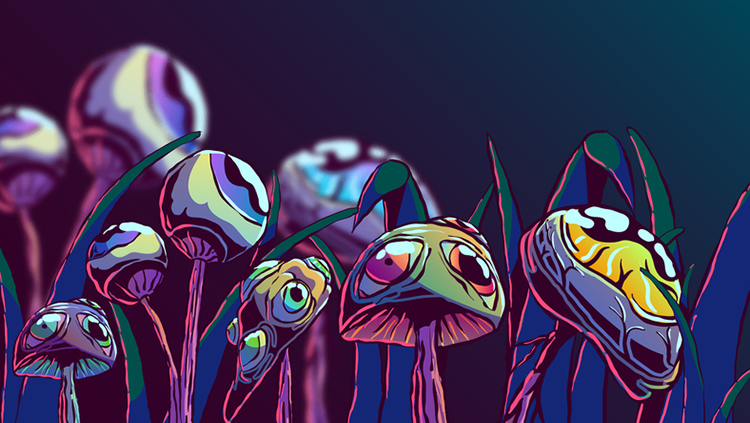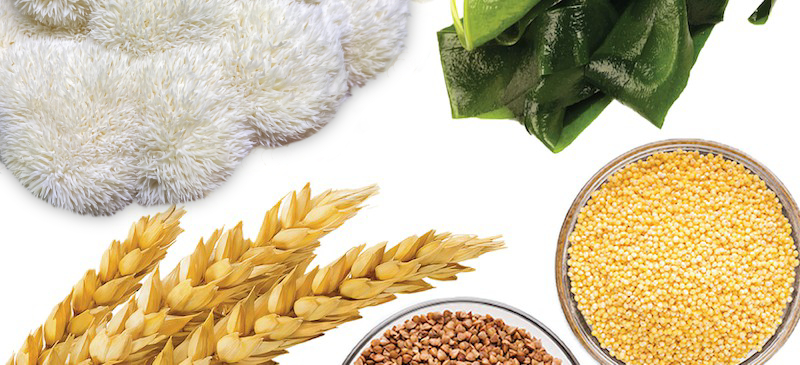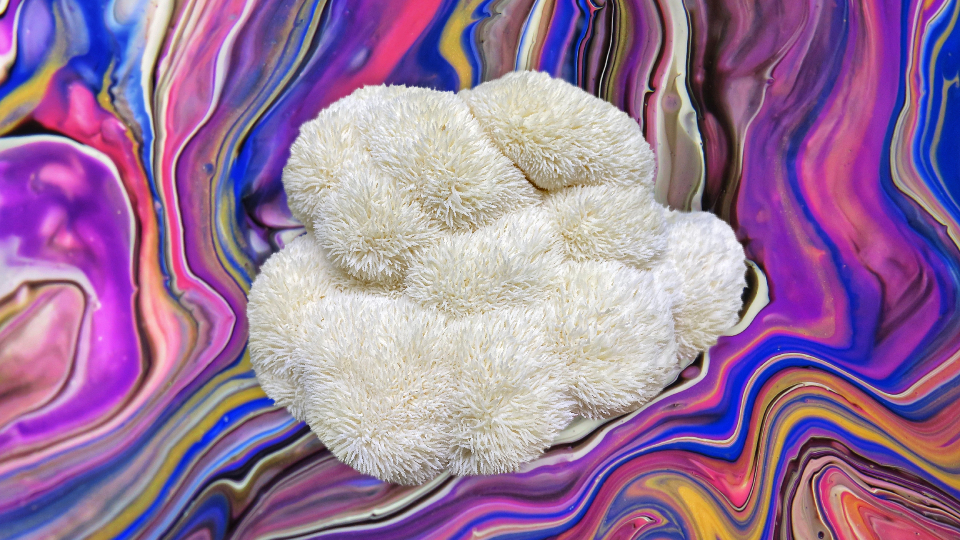Is Lion’s Mane Mushroom Psychedelic? What You Should Know
Are you curious if Lion’s Mane mushroom is psychedelic? The answer is certain, they’re non-psychoactive—no psilocybin, no mind-altering effects. While magic mushrooms are notorious for their illegal status and recreational use, Lion’s Mane mushrooms are adaptogens, boasting health benefits.
In this article, we’ll explore everything you need to know about the so-called “psychedelic potential” of Lion’s Mane, from its fascinating medical compounds to the reasons behind its growing popularity in the wellness world.
In this article:
What Are Lion’s Mane Mushrooms?
The name “Lion’s Mane” comes from the mushroom’s distinctive appearance, with its flowing white tendrils that resemble the shaggy mane of a lion. This eye-catching look naturally draws attention and curiosity. Found thriving in North America, Europe, and Asia, these mushrooms have earned a prominent place in traditional Chinese medicine.
For centuries, they’ve been celebrated for their powerful medicinal properties, thanks to the diverse range of bioactive compounds they contain. Their combination of visual appeal and health benefits has made them a fascinating subject for both ancient practices and modern research.
What is a Psychedelic Mushroom?

Before we dive into Lion’s Mane mushrooms’ potential psychedelia, let’s clarify what psychedelic mushrooms are about. Often called “magic mushrooms,” these fungi are famous for causing hallucinations. They contain psilocybin, a natural compound that can alter consciousness, leading to hallucinations and changes in perception and thinking[1].
People consume psychedelic mushrooms in various ways—eating them, making tea, or drying and powdering them. While mainly used for fun, recent findings suggest they might help with certain mental health conditions like depression.
In the US, it’s illegal to grow, sell, or have mushrooms with psilocybin or other hallucinogens.
Are Lion’s Mane Mushrooms Psychedelic?
No, Lion’s Mane mushrooms aren’t psychedelic. They won’t make you hallucinate like psilocybin-containing ones. They’re safe to eat and won’t mess with your mind. It’s key to separate functional from psychoactive mushrooms—they’re often mixed up.
Psilocybin mushrooms are mostly illegal in the US, except in Oregon and Colorado for medical use. Functional mushrooms won’t give you trippy experiences, but they can do wonders for your body.
Actually, these adaptogenic mushroom supplements can boost your spiritual practices like yoga, meditation, and mindfulness.
Does Lion’s Mane Mushroom Get You High?
How do Lion’s Mane mushrooms make you feel? Do they get you high? Eating Lion’s Mane mushrooms can bring on a bunch of positive vibes. Lots of folks say they feel clearer, more focused, and sharper mentally after having them.
These mushrooms are thought to be great for your brain, boosting memory and concentration. Plus, they might help balance your mood, easing feelings of anxiety and depression.
The Benefits of Lion’s Mane
Research suggests that Lion’s Mane mushrooms may have antioxidant and anti-inflammatory properties, which can help combat oxidative stress and inflammation in the body. These mushrooms have also been studied for their potential to support brain health and cognitive function[2].
Here is the list of its benefits:
- Neuroprotective – Supports brain health and cognitive function.
- Nerve Growth Factor – Promotes nerve growth and regeneration.
- Mood Regulation – Alleviate symptoms of depression and anxiety.
- Cognitive Enhancement – Enhances memory, focus, and concentration.
- Immune Support – Supports a healthy immune system.
- Anti-Inflammatory – Exhibits anti-inflammatory properties.
- Digestive Health – Supports a healthy digestive system.
- Blood Sugar Control – Help regulate blood sugar levels.
These benefits are attributed to the various bioactive compounds present in Lion’s Mane mushrooms, but further research is still necessary to fully understand and confirm their effects on human health.
Its Medical Compounds and Benefits
Beta Glucans
The presence of Beta-Glucans in Lion’s Mane mushrooms actively supports the immune system and contributes to overall health. These polysaccharides interact with immune cells, stimulating their activity and promoting a robust immune response. By enhancing immune function, Beta-Glucans assist the body in defending against pathogens and maintaining optimal health[3].

L-glutamine and L-glutamic Acid
L-glutamine plays a vital role in protein synthesis, immune system support, and maintaining intestinal health. It aids in muscle recovery and may improve athletic performance. L-glutamic acid acts as a neurotransmitter in the central nervous system, facilitating communication between nerve cells. It plays a crucial role in memory, learning, and brain function. Together, these amino acids contribute to overall health and well-being[4].
Prebiotic Fibers
The prebiotic fibers found in Lion’s Mane mushrooms provide nourishment to beneficial gut bacteria, supporting a healthy microbiome. These fibers act as food for probiotics, promoting their growth and colonization in the gut. By maintaining a balanced gut microbiota, Lion’s Mane mushrooms contribute to improved digestion, nutrient absorption, and overall gut health[5].
Polypeptides
The neuroprotective properties of polypeptides found in Lion’s Mane mushrooms have shown promise in preserving and supporting brain health. These compounds have the potential to benefit cognitive functions by protecting nerve cells and promoting optimal function. Consuming Lion’s Mane mushrooms rich in polypeptides may contribute to improved memory, focus, and overall cognitive well-being[6].
Polysaccharides
The abundant polysaccharides found in Lion’s Mane mushrooms have been linked to immune-boosting effects and overall well-being. These complex carbohydrates interact with the immune system, enhancing its response against pathogens and promoting immune health. Consuming Lion’s Mane mushrooms, which are rich in polysaccharides, can potentially strengthen the immune system and improve overall health[7].
Digestive Enzymes
It also contains digestive enzymes that aid in the breakdown and absorption of nutrients. These enzymes support optimal digestion by assisting in the breakdown of complex molecules into smaller, more readily absorbable forms. By improving nutrient absorption, Lion’s Mane mushrooms contribute to overall digestive health and nutrient utilization[8].
Hericenones and Erinacines
In Lion’s Mane mushrooms, hericenones and erinacines stand out for their ability to stimulate nerve growth factor (NGF) production. NGF is vital for nerve cell growth, maintenance, and regeneration. These compounds found in Lion’s Mane might aid nerve cell function and potentially safeguard brain health, benefiting cognitive abilities[9].
Spiritual Benefits of Lion’s Mane
In addition to their physical benefits, Lion’s Mane mushrooms are sometimes associated with spiritual benefits. According to some individuals, consuming Lion’s Mane can potentially enhance creativity, elevate intuition, and foster a profound sense of spiritual connectedness.
Increased Awareness
By consuming Lion’s Mane mushrooms, individuals can enhance mindfulness and promote heightened awareness. This cultivates a stronger connection with their thoughts, emotions, and sensory experiences. The increased awareness facilitates a deeper engagement with oneself and the surrounding environment, enabling a full presence in the present moment.

Expanded Consciousness
Some people have experienced an expansion of consciousness when consuming Lion’s Mane mushrooms. This heightened awareness leads to a deeper understanding of oneself, others, and the universe. It fosters profound insights and personal growth, offering individuals a broader perspective and a stronger sense of interconnectedness. Such expanded consciousness creates opportunities for exploration, creativity, and self-discovery.
Spiritual Connection
Others believe that consuming these mushrooms can open doors to spiritual experiences, allowing individuals to tap into higher realms of consciousness. This heightened spiritual connection can provide individuals with a deeper understanding of their spiritual path, their place in the universe, and their connection to something greater than themselves. It can foster a sense of awe, reverence, and transcendence.
Inner Healing and Emotional Well-being
Consuming lion’s mane can help with deep-seated emotional issues, traumas, and blockages. Having them daily might enhance your ability to understand and handle emotions, fostering healing and personal growth. This emotional healing may lead to a stronger sense of inner peace, balance, and better mental health overall.
Heightened Intuition
People notice an increase in intuition and psychic abilities after having Lion’s Mane mushrooms. This heightened intuition helps you make better decisions and navigate life’s challenges with clarity. It might boost your trust in instincts and access deeper insights. This expanded intuition brings a sense of empowerment and confidence in your decision-making.
It’s important to approach the spiritual use of Lion’s Mane mushrooms with respect and intention. Each person’s experience may vary, and it is crucial to create a safe and supportive environment when exploring the spiritual aspects of these mushrooms.
Side Effects of Lion’s Mane
Side effects of Lion’s mane are rare, and this mushroom is generally considered safe for consumption. However, some people may experience mild digestive discomfort or allergic reactions.
As with any new supplement or dietary change, it’s wise to start with a lower dose and monitor your body’s response. If you have any underlying health conditions or concerns, it’s best to consult a healthcare professional before incorporating Lion’s Mane into your routine.
FAQs
How Does Lion’s Mane Make You Feel?
Lion’s Mane Mushrooms can make you feel more focused, alert, and mentally sharp. It may also promote a sense of well-being and help reduce symptoms of anxiety and depression. Additionally, some people report increased creativity and improved memory. Regular consumption of Lion’s Mane can contribute to overall cognitive health and vitality.
What Drug is Lion’s Mane?
Lion’s Mane is not a drug. It is a type of mushroom that is commonly used in traditional medicine and dietary supplements. It is known for its potential cognitive and health benefits. Lion’s Mane is considered a natural and safe option for supporting brain health and overall well-being.
Is Lion’s Mane mushroom illegal?
No, Lion’s Mane mushroom is not illegal. It is a legal and widely available mushroom that is commonly used in traditional medicine and as a dietary supplement. You can purchase Lion’s Mane products in various forms, such as capsules, powders, or extracts, without any legal restrictions.
What are the Psychological Effects of Lion’s Mane?
The psychological effects of Lion’s Mane include enhanced cognitive function, improved focus and mental clarity, reduced symptoms of anxiety and depression, and a sense of well-being. However, individual experiences may vary, and it’s advisable to consult with a healthcare professional for personalized advice.
Is Lion’s Mane a Psychedelic?
No, Lion’s Mane is not considered a psychedelic. It does not have psychoactive properties and does not induce hallucinations or altered states of consciousness like psychedelic substances do. Lion’s Mane is a functional mushroom known for its potential cognitive and health benefits, rather than its psychedelic effects.
Can Lion’s Mane Make You Hallucinate?
No, Lion’s Mane can not make you hallucinate. They are not known to cause altered states of consciousness or psychedelic effects. Lion’s Mane is commonly consumed for its potential cognitive and health benefits, rather than its ability to produce hallucinations.
Takeaways on Lion’s Mane Psychedelic
Medicinal mushrooms like Lion’s Mane are not classified as psychedelic mushrooms since they lack psilocybin, the compound responsible for psychedelic effects. However, they offer a range of potential health benefits. These include immune support, neuroprotection, gut health promotion, and cognitive enhancement.
Practically, this potent mushroom extract has shown promise in improving memory, focus, and mood. Additionally, its neuroprotective properties may support brain health and potentially reduce the risk of age-related cognitive decline. Remember, Lion’s Mane mushrooms are fascinating and unique, but they should not be mistaken for psychedelic mushrooms.
References
1. The Mushroom Psilocybin with Psychedelic Properties. Retrieved from https://www.researchgate.net/publication/300837982_The_Mushroom_Psilocybin_with_Psychedelic_Properties
2. Improving effects of the mushroom Yamabushitake (Hericium erinaceus) on mild cognitive impairment: a double-blind placebo-controlled clinical trial. Retrieved from https://onlinelibrary.wiley.com/doi/abs/10.1002/ptr.2634
3. The Inhibitory Effects of Hericium erinaceus β-glucan on in vitro Starch Digestion. Retrieved from https://www.ncbi.nlm.nih.gov/pmc/articles/PMC7859327/
4. Development of fermented Hericium erinaceus juice with high content of L-glutamine and L-glutamic acid. Retrieved from https://ifst.onlinelibrary.wiley.com/doi/10.1111/ijfs.12873
5. The Prebiotic Activity of Simulated Gastric and Intestinal Digesta of Polysaccharides from the Hericium erinaceus. Retrieved from https://www.researchgate.net/publication/329332383_The_Prebiotic_Activity_of_Simulated_Gastric_and_Intestinal_Digesta_of_Polysaccharides_from_the_Hericium_erinaceus
6. Effects of Hericium erinaceus polypeptide on lowering blood lipids of mice with hyperlipidemia induced by a high-fat diet. Retrieved from Effects of Hericium erinaceus polypeptide on lowering blood lipids of mice with hyperlipidemia induced by a high-fat diet
7. Polysaccharides from Hericium erinaceus Fruiting Bodies: Structural Characterization, Immunomodulatory Activity and Mechanism. Retrieved from https://www.ncbi.nlm.nih.gov/pmc/articles/PMC9503163/
8. Digestive Characteristics of Hericium erinaceus Polysaccharides and Their Positive Effects on Fecal Microbiota of Male and Female Volunteers During in vitro Fermentation. Retrieved from https://www.researchgate.net/publication/359633772_Digestive_Characteristics_of_Hericium_erinaceus_Polysaccharides_and_Their_Positive_Effects_on_Fecal_Microbiota_of_Male_and_Female_Volunteers_During_in_vitro_Fermentation
9. Hericenones and erinacines: Stimulators of nerve growth factor (NGF) biosynthesis in Hericium erinaceus. Retrieved from https://www.researchgate.net/publication/240235316_Hericenones_and_erinacines_Stimulators_of_nerve_growth_factor_NGF_biosynthesis_in_Hericium_erinaceus

